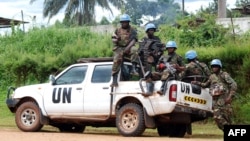The government spokesman in the Democratic Republic of Congo has criticized the United Nations after two U.N. officials were kidnapped in the center of the country Sunday. The spokesman says his government had not been informed of their movements.
Michael Sharp, an American, and Zahida Katalin, a Swedish citizen, as well as the four Congolese nationals accompanying them, were kidnapped in the province of Kasai Central in central DRC.
The U.N. mission in the DRC, known as MONUSCO, and the Congolese security forces have been looking for the six since being informed of their abduction, but so far without success.
DRC's communications minister, Lambert Mende, told VOA on Wednesday that the government did not know Sharp and Katalin were in the country, which is not acceptable. Mende says U.N. officials are free to carry out their inquiries and humanitarian work, but that it is necessary to inform authorities of their presence.
The Kasai region, where the kidnapping took place, has been the scene of an escalating conflict between the DRC's security forces and militiamen since August of last year when the Congolese military killed a customary chief, known as Kamwina Nsapu. A militia of his followers is now active in the three provinces of Kasai and in Lomami Province. More than 400 people have been killed and 200,000 displaced by the violence, according to the U.N.'s Office for the Coordination of Humanitarian Affairs.
The DRC's interior minister told Jeune Afrique, a French magazine, that members of that militia had carried out the attack.
Mende told VOA that if local authorities had been informed of the officials' presence, they could have provided an escort or warned the U.N. group that the area is an operational zone where militants are active.
Sharp and Katalin are members of the U.N.'s Group of Experts on the DRC, which carries out research into conflict in the country and reports directly to the Security Council. The U.N. has more than 19,000 peacekeeping troops in the DRC, but most are deployed in the east rather than the country's center.
